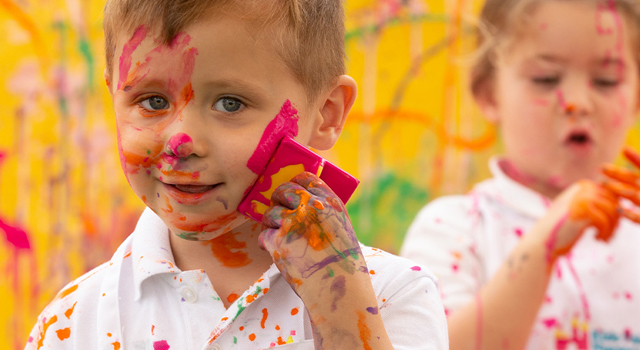Curriculum
It is designed to suit infants and toddlers up to FS2 through a well-balanced timetable and effective teaching techniques.
We follow an active learning approach to get children involved.
To put it simply, learning by doing is most important.
Hands-on learning or experiential learning helps children to engage themselves in an activity that focuses on building verbal/non-verbal communication skills, fine and gross motor skills, as well as cognitive and creative capabilities.
Our professional educators will ensure that every child achieves mastery of the given concepts at their own pace, while enjoying the learning process.
Kids Palace Nursery adheres to the standards set by the Early Years Foundation Stage Framework in regard to the seven areas of learning and development. This helps chart the developmental stages of a child from birth to 5 years.
All areas of our curriculum, at every stage, is enriched and developed through the active learning approach.
Active learning can support children’s development by encouraging them to become successful learners, confident individuals, responsible citizens and effective contributors.
The EYFS framework is based on seven areas of development which guide early year’s professionals in their planning and engagement with your child’s play and activities as they learn new skills and knowledge.
The three prime areas are the most important and are the areas that your child should develop first:
• Communication and Language: this involves the development of a child’s ability to interact with the world around them.
This includes a child’s ability to understand gestures and language as well as his/her ability to express his/her wants and needs.
Circle time, story-telling, singing and rhyming are all ways of stimulating the development of communication and language skills.
• Physical Development: this includes a child’s understanding of their own self-care and their large (gross-motor) and small (fine-motor) movements.
It includes developing coordination and the ability to safely negotiate the space around them.
Activities including outdoor play, water play, sensory play, yoga and football and tennis all help to promote a child’s physical development.
• Personal, Social and Emotional Development: this includes a child’s self-awareness, their independence, their resilience and ability to adapt to new situations.
It involves developing skills to positively interact with others and to have respect for themselves.
Development in this area is promoted through our daily routine, classroom guidelines, social interaction with adults and other children, circle time, meal-times and show and tell.
The development in the above prime areas will allow children to develop in the following specific areas:
• Literacy: this is how children understand that words have meaning.
It is important to develop a child’s pre-literacy skills such as listening well before introducing them to letter sounds and their formation.
Children enjoy storytelling, singing, rhyming, listening walks, mark-making and sensory which all help to promote literacy skills.
• Mathematics: this area includes understanding positional language, problem-solving, counting, patterns, shapes and concepts such as more, less, equals. Through songs, rhymes, games and activities, measuring, cooking, water,-play, children have plentiful opportunities to develop their mathematic skills.
• Understand the world: this is how a child perceives the world around them and includes topics such as technology, geography, science to name a few.
We promote children’s curiosity and encourage them to question why and how thing happen.
• Expressive arts & design: this looks at promoting a child’s skills in expressing their thoughts, emotions, and needs through different means such as dance, music, singing, and role-play.
By providing children with a range of media, equipment, materials and instruments, we encourage them to express themselves in their own way.



